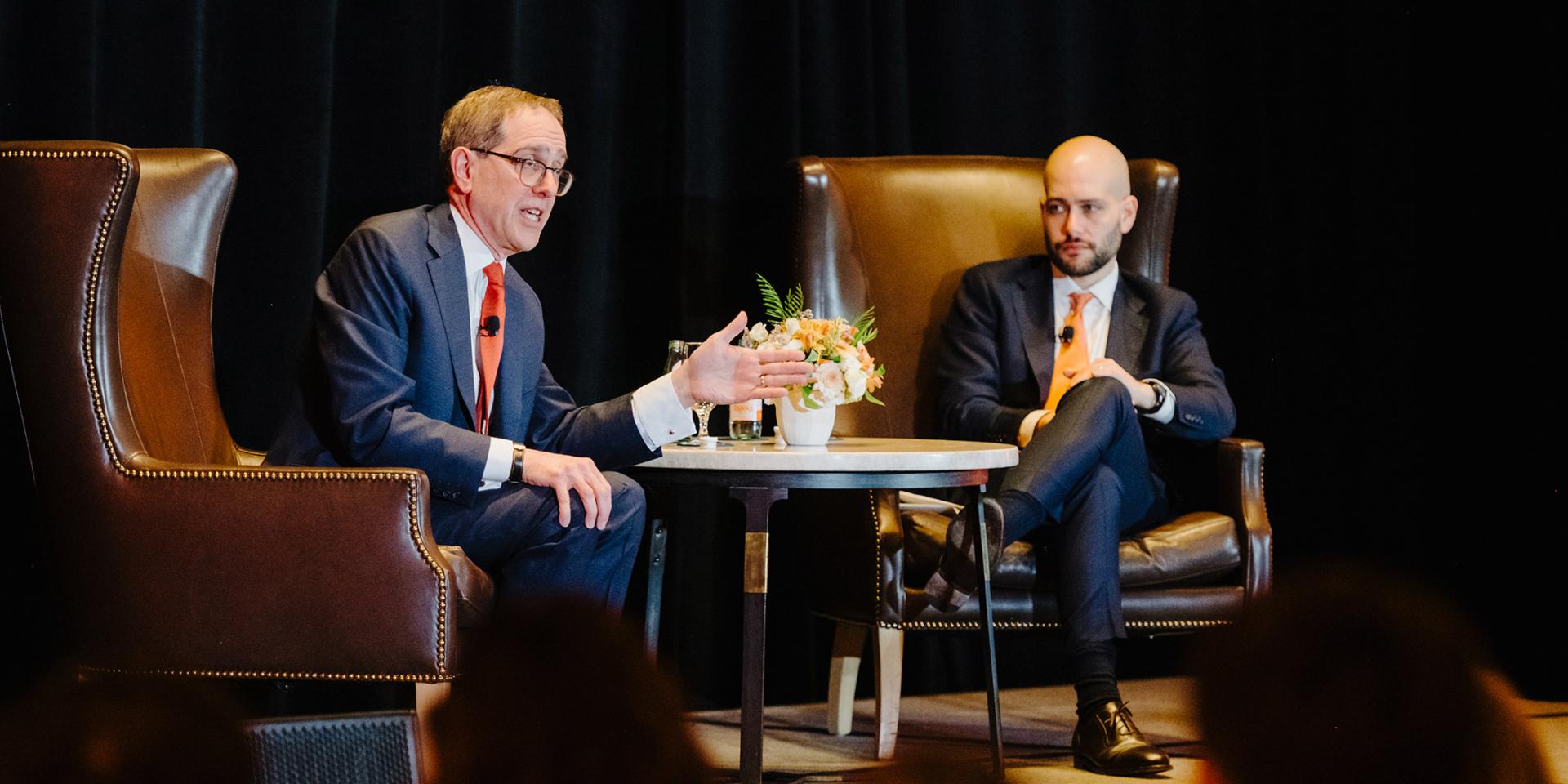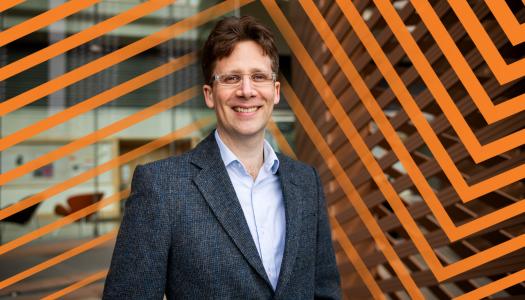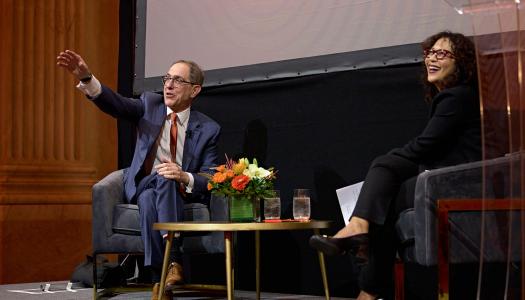President Eisgruber in Austin, Texas, with Gabe Debenedetti ’12, national correspondent for New York Magazine. Photo by Photohouse Films
Alumni extend a Texas-sized welcome to President Eisgruber at Venture Forward events in Austin and Houston
At two all-alumni Venture Forward events in Texas, President Christopher L. Eisgruber ’83 shared updates on the University’s strategic priorities in on-stage conversations with alumni interviewers.
In Austin, Texas, on Jan. 7, Eisgruber spoke with Gabe Debenedetti ’12, national correspondent for New York Magazine, in front of an audience of about 175 alumni and friends at the Four Seasons Hotel Austin. Among other topics, they discussed the national perception of higher education, student service and activism, the role of university presidents, the importance of the humanities and the transformation of the Princeton campus as it completes multiple construction projects.
The next day in Houston, Texas, Christopher Sarofim ’86, chairman of Fayez Sarofim & Co., welcomed Eisgruber at the Houstonian Hotel, where their conversation in front of more than 200 alumni and friends addressed such topics as campus expansion and student opportunity, Princeton’s commitment to the liberal arts, the new Princeton University Art Museum, leadership philosophy and the University’s commitment to free speech and equality.
The Houston event also featured an address from Dean of the Graduate School Rodney Priestley, who spoke at the reception prior to the conversation between Eisgruber and Sarofim.
Both events featured the “Making Audacious Bets” Venture Forward campaign video and a welcome from Alumni Association President and Alumni Council Chair Monica Moore Thompson ’89. “It is truly an honor to be here with you tonight,” she said in Austin. “I am Princeton, you are Princeton. And together, we are Princeton. That ‘we’ is a powerful and positive force. And the Venture Forward campaign highlights alumni engagement as one of its strategic pillars, shining a bright light on the many ways alumni come together as individuals to learn, to volunteer and to celebrate like we’re doing this evening.”
The dual events in Texas are part of this year’s Venture Forward tour that also brought Eisgruber to an all-alumni gathering in Philadelphia in December. The final event for the year will be held in Seattle on April 2.
Here are some of the top takeaways from the Texas events:
“It’s great to have President Eisgruber here in Austin,” said Debenedetti. “Hopefully you’re feeling comfortable in another town that knows how to wear orange.” The New York Magazine correspondent moved from that opener, which was well-received by the orange-and-black clad audience, to discuss how higher education and institutions like Princeton are portrayed by the media. “I hate to invoke one of my professional rivals, but I want to point your attention to the most recent cover of the Atlantic Magazine, which purports to explain, and I quote, ‘How the Ivy League Broke America,’” he said, asking Eisgruber to comment on how Princeton and academia is perceived today.
“Let me start actually just by talking about what it is that we do at Princeton and why we shouldn’t be too surprised when you see articles of this kind that are critical,” Eisgruber said. “The theme of the [Venture Forward] video we just saw is about making audacious bets in human talent and in human excellence. That goes to the core of what we do in our education and our research. We invest in our students and our faculty members in ways that are really unusual, and we give people unusual freedom to pursue their ideas and their passions. It means people are going to wonder about these places that produce ideas that are often focused on a time horizon far different than the rest of society is looking at.”
Eisgruber noted that throughout American history, there has been “a mixture of pride and suspicion as people look at institutions. People on both sides of the political spectrum are worried about where it is that the country is going. There’s a lot of polarization around issues, a lot of tension among different groups. So I think that gives us a burden as a university. It gives me a responsibility as a university president to talk about what it is that we are doing and to explain why those audacious bets matter to the future of the country.”
Debenedetti asked whether scrutiny on higher education has led to more interaction with peers at other universities, and why the University’s approach to making statements about issues of national or international importance has changed.
In his role as chair of the Association for American Universities, Eisgruber said, he has been spending more time engaging with peers, and that an approach of institutional restraint regarding making statements has been a key topic. “This issue is much discussed today among university presidents because there’s so much attention to when universities speak out, when presidents speak out. My principal job, the job of a president of a university is not to be telling other people what it is that they should think,” he said. “My job is to make sure that people on the campus can express their views, have the arguments that we want them to have and have a vibrant discussion about issues.”
Conversations in both Austin and Houston featured questions about the importance of the humanities at Princeton University. In Austin, Debenedetti asked “What sort of investment or focus internally is needed to ensure that the humanities remain a central part of the university’s mission, but not just to keep AI humane, for example, but the humanities for their own merits?”
Eisgruber noted that the University’s abiding commitment to the humanities is sustained by investments in facilities like the new art museum, faculty and new areas of inquiry as well as those that are foundational.
“We have to be willing to invest in the facilities that are necessary for great humanities departments, just as we invest in the facilities that provide the essential laboratories in other fields,” he said. “The most important thing that we need to be doing is to continue to hire faculty of the highest quality. Our humanities division remains the largest division in the University in terms of the size.
He referred to Chika Okeke-Agulu, Robert Schirmer Professor of Art and Archaeology and African American Studies and director of the Africa World Initiative, who was featured in the Venture Forward video and is leading the effort to understand how Africa and African culture is central to the future.
“I think those questions, which are profound and eternal, remain important to every aspect of a Princeton education and they remain important to our quest for research excellence. What we also have to do is continue to invest in the quality of what hasn’t changed, like our philosophy department. There are some people who are asking new questions that I guess couldn’t have been asked before about artificial minds, but most of them are asking questions that could have been asked and were asked in one form or another 2,000 years ago, and they’re one of the best four philosophy departments in the country.”
In Houston, Sarofim asked about Princeton’s commitment to the liberal arts amid a national push for expansion of STEM education.
“I think liberal arts education is essential to STEM education and I think STEM education, conversely, is essential to liberal arts education,” Eisgruber said. “I’m a physics major who went to Princeton because I wanted to make sure that I could take courses in things like comparative literature and political theory.
“As we deal with a world where technology is changing very rapidly and where the human element becomes important in the application of those technologies and understanding what they need to be doing for our society, we want people who are deeply trained in the humanities and have addressed these questions that are profound about what the purposes are of our civilization and what it means to be a healthy and thriving culture,” he added.
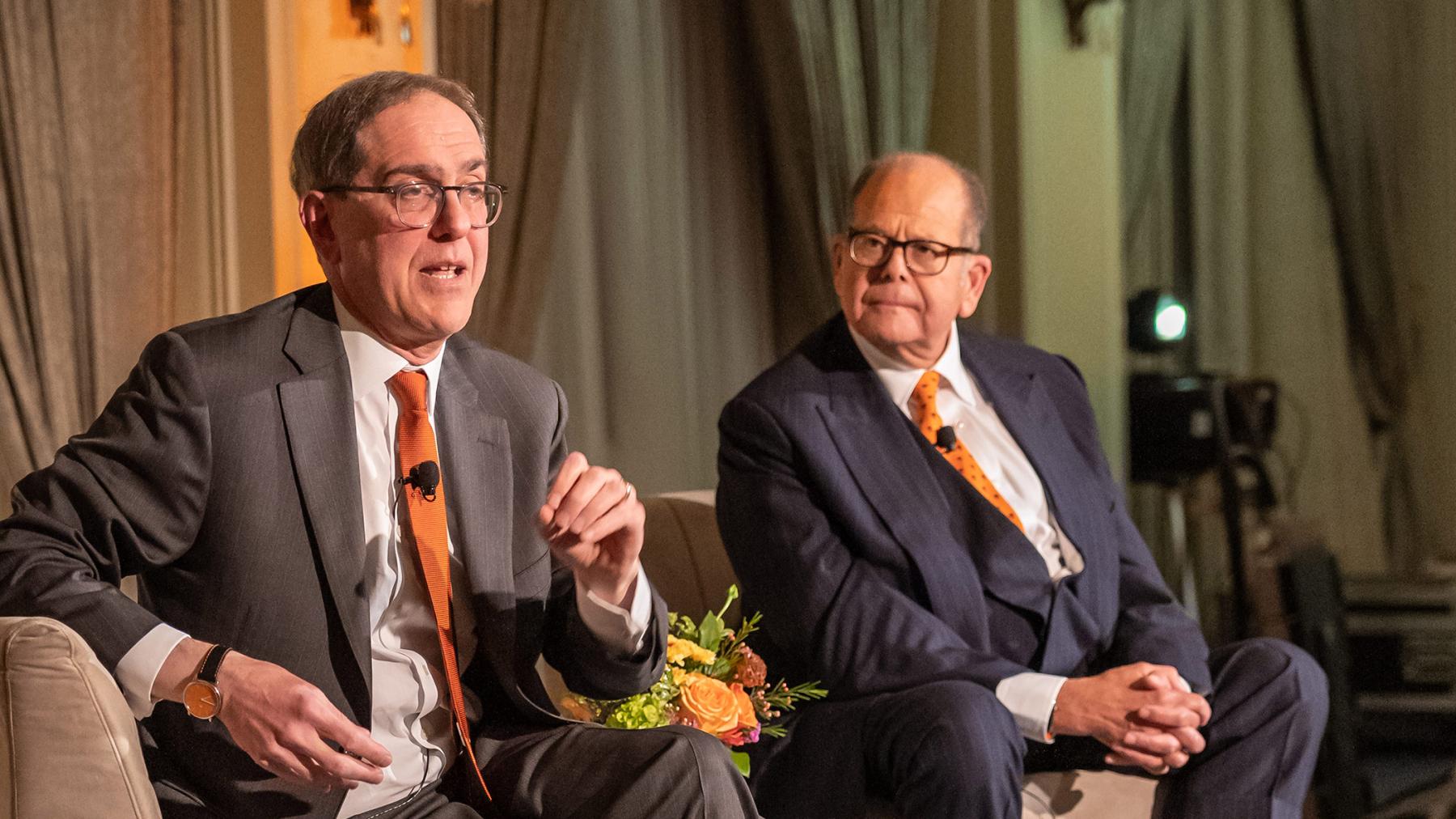
Eisgruber also mentioned the new Princeton University Art Museum, and Sarofim, who said the time he spent at the museum when he was a student had a major impact on his education, asked the president for a “sneak preview”: “Tell us a little bit more about how the new museum compares to the old one and what the museum is going to offer.”
“There were times with the old art museum when I’d be literally walking right by the museum and a tourist would stop me and say, ‘I’m looking for the Princeton University Art Museum. Where is it?’ I’m not going to have to answer that question anymore,” Eisgruber said. “The new museum is going to be unmistakable on the campus in a way that will draw people into the space. You can see the art in that museum without passing through the security barriers.”
New gallery spaces, he noted, will allow the museum to display more works of modern and contemporary art than in the old facility, and this has inspired spectacular new gifts of art. He also noted the cross-disciplinary centrality of the museum. “From the moment of its founding in the 19th century, this wasn’t just an art museum on the campus of the university. It was an art museum that was designed to be a part of the educational program of the University. So, the design has been thoughtful in encouraging teaching about art and the use of this art in a variety of classes across the humanities and other disciplines.”
Sarofim turned the conversation to the increased scrutiny and difficulties that institutions of higher education have experienced in recent years, noting campus protests among other issues. “You seem to have done this very well when others have run into much more difficulty. What have you done differently and what has made Princeton so successful?” he asked.
Thanking Sarofim for the way he had framed the question, Eisgruber said “I can just say these last years have been very hard years on university campuses and the challenges have been very difficult. And I have tremendous respect for my colleagues at other universities and the challenges that we’ve faced. I also feel blessed in a lot of ways by circumstances of Princeton University that make my job different from a lot of others.”
Among those circumstances, he said, is the support and advocacy of alumni, as well as a cohesive community of faculty and students on campus, an extraordinary leadership team and staff, and a strong commitment to principles of free speech and equality.
“We have the best alumni of any university in the world and that makes a difference when you’re going through tough times,” he said. “It makes a difference to have a community that comes together like this, a community of people who are willing to literally wear their allegiance in bright orange and speak up for their university and recognize that they want that university to succeed even when they disagree with some of the things that may be happening there. You have to have that benefit of the doubt for an institution to go forward. That matters.”
The conversations in Austin and Houston were followed by Q&A sessions; audience members asked a wide array of questions about such topics as student service, Annual Giving and the endowment, student well-being, post-season athletics competition, the current political environment for higher education and academic areas such as artificial intelligence.
In Houston, in answer to an audience member’s question about proposals in Washington, D.C., to further tax university endowments, Eisgruber noted that he is spending more time in the capital speaking with members of Congress. “Because when you talk about taxes, it’s not the [U.S.] president who gets to decide what the taxes are. The Tax Cut and Jobs Act of 2017, which you were referring to, came out of Congress, imposed a 1.4% tax on endowment returns. That makes it more difficult for us to keep our education affordable, to push into new areas of research and to support the kinds of audacious bets that we want to make on students.”
Part of the dialogue, he said, is helping tell the story about why higher education matters, and that endowments are akin to annuities that have to pay for the university’s operating costs for perpetuity. “Our endowment at Princeton right now is paying out 5.3% each year,” he said. “We would spend it all down in 20 years if it weren’t for our investments and for the fundraising that we do.”
The endowment accounts for 70% of the University’s operating budget and supports every aspect of what Princeton University does, he noted, including faculty salaries, financial aid, service programs, athletic teams and all other aspects of the institution. A healthy endowment, he said, is “important for America and America’s prosperity. When you educate people well, when you make education affordable, when you do research into subjects that produces surprising innovations, that helps this country to be strong and prosper.”
In Austin, Eisgruber noted during the Q&A that 71% of the graduating class each year is on financial aid and 83% graduate debt-free. “That means we’re reaching students from all sectors of the American income distribution,” he said. “We’re reaching students from low-income families, we’re reaching students from middle-income families, we’re reaching students from upper-middle-income families. So thank you for the opportunity to speak to what our endowment does. Thank you for enabling me to talk a bit about what Annual Giving does — and to all of you, thank you for what you do for Annual Giving. I could not state those numbers if it weren’t for what you do.”
At the reception prior to the Houston conversation between Eisgruber and Sarofim, Dean of the Graduate School Rodney Priestley spoke about the Graduate School’s legacy of outstanding academic excellence and the unparalleled resources and benefits for graduate students that help them to thrive at the University.
“We now house 70% of our grad students on campus, which really allows us to ask questions that other schools can’t ask,” Priestley said, “like what kind of communities can we build? That goes back to the history of the Graduate School and the Graduate College itself built in 1913 — to really build a community of scholars. We are focused on making sure we bring that community together, that we build a community of scholars that challenges one another and helps us move forward in the research mission of the institution.”
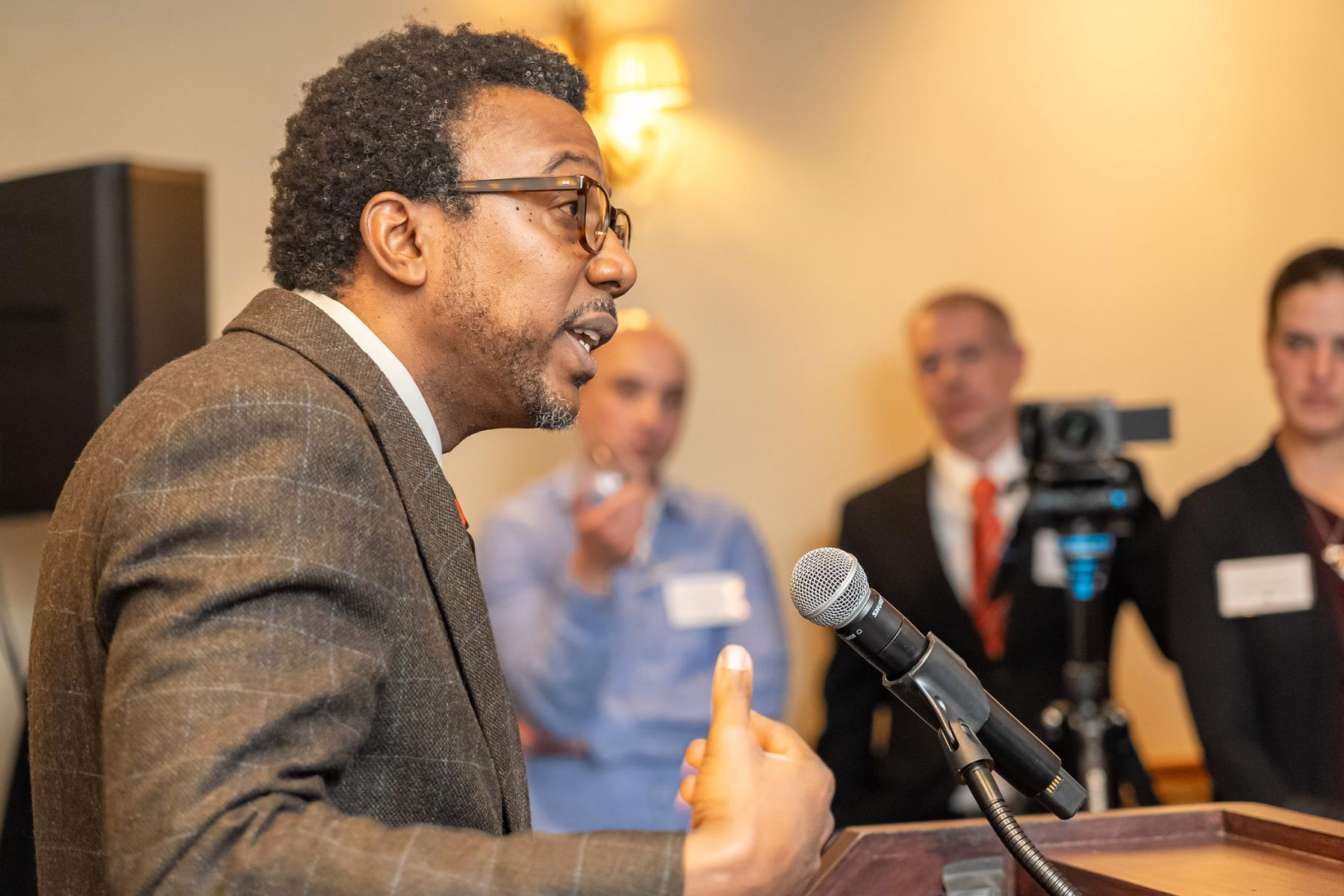
“It is really my honor to come back home and to share with you all,” said Priestley, who grew up in Houston. He noted in his remarks that the Graduate School will be celebrating its 125th anniversary in the fall of 2025, and that the University’s next alumni conference will be the “Many Minds, Many Stripes” conference celebrating graduate alumni. From its founding, he said, the Graduate School has had “a transformative impact on Princeton and a transformative impact on higher education — and we know that its alumni have had a transformative impact on academia and sectors beyond that as well. As President Eisgruber says, the secret sauce of the institution is its alumni, and I couldn’t agree with him more.”
Both Venture Forward events concluded with singing of “Old Nassau,” led in Austin by Ty Gardner ’20 and in Houston by Mary Pogue ’93, Randle Seymour ’93 and Franklyn Darnis ’15, followed by lively receptions that allowed alumni to connect and converse.
The Venture Forward campaign is a mission-driven campaign that is focused on Princeton University’s strengths in the liberal arts, pushing the boundaries of knowledge across disciplines, and collaborating to champion inclusion, the humanities, science, art, public policy and technology. The campaign has three areas of impact: deepening engagement of Princeton’s alumni community; providing a platform to communicate Princeton’s service to humanity and its vision for the future; and securing philanthropic support for the University’s strategic initiatives.
